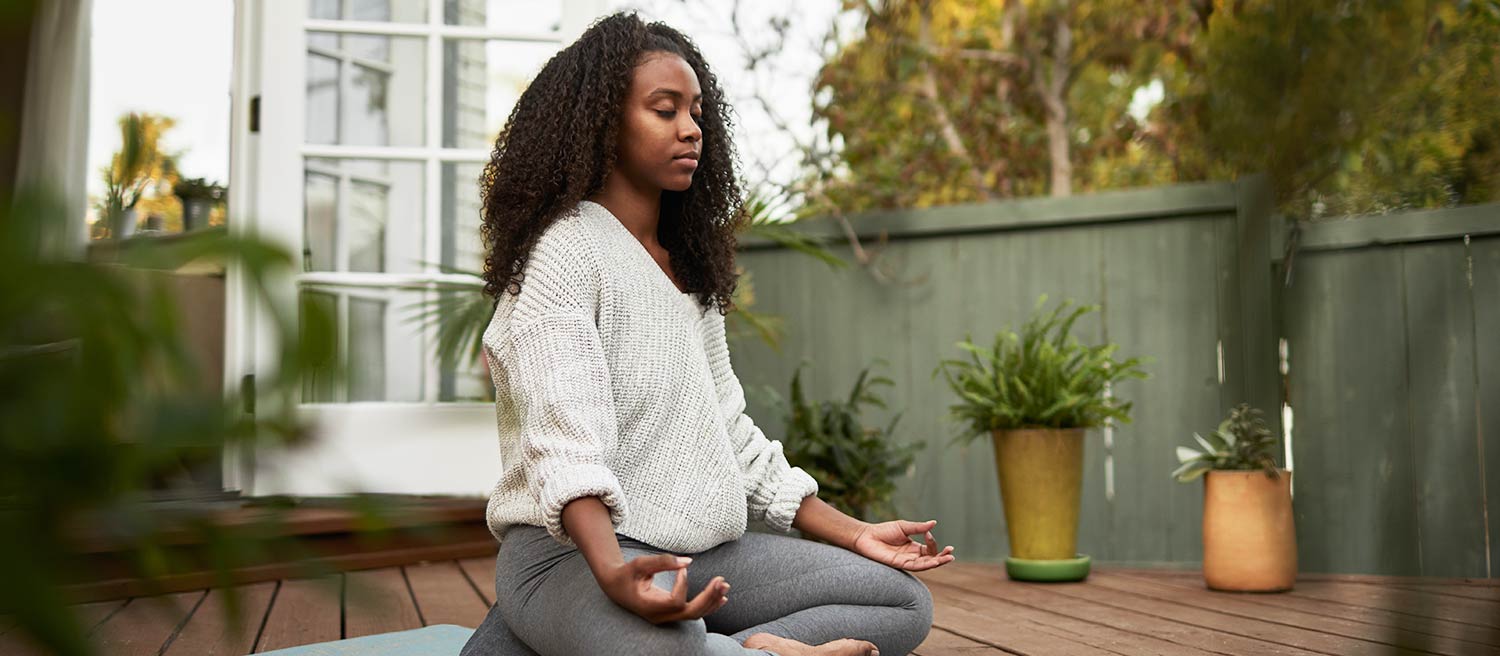
How to Relax Before Bed: The Stress is Real
You don’t need an expert to tell you that this past year has been a stressful one. While you’re most likely doing everything you can to practice self-care, learn how to relax before bed and take care of your mental health, moments of stress and anxiety are expected.
Stress manifests itself in different ways and can take a toll on your body, relationships and quality of life. While our bodies are designed to handle small doses of stress, avoiding it can come with consequences.
How Stressed are You? 
It’s also clear that our stress may be impacting our ability to sleep.
According to a new survey from the American Academy of Sleep Medicine, more than one in five Americans are sleeping worse than before the pandemic, and 19% say they are getting less nightly sleep. Consequences of the pandemic such as lack of work life balance, a disruption in daily routines and economic worries can all take a toll on our physical and mental health, making it difficult to get a good night’s sleep.
The Importance of a Bedtime Routine
Bedtime routines aren’t just for children. Having some type of bedtime ritual (past putting on your PJs) can help us get the sleep we need and feel ready to tackle the day. The Centers for Disease Control and Prevention (CDC) suggests adults need at least seven hours of sleep a night.
Proper sleep hygiene is not just about getting enough sleep but also getting a good quality of sleep. For adults, quality sleep means that you typically fall asleep in 30 minutes or less, sleep soundly through the night with no more than one awakening, and drift back to sleep within 20 minutes if you do wake up.
Studies have shown that in order for adults to get an adequate quality of sleep, they also need to maintain consistent sleep routines. Before discussing new bedtime rituals to try, we’ll help you recognize signs of poor sleep hygiene.
Signs of Poor Sleep Hygiene
While none of these sound like a walk in the park, there are easy ways to combat poor sleeping hygiene just by changing your bedtime routine. Still not convinced? We’ve looked to sleep and stress experts for the latest and greatest hacks for relaxing before bed and optimizing your bedtime for S-L-E-E-P.
How to Relax Before Bed: 12 Activities to Try
Be at ease as we help you catch some Z’s with these 12 activities to try. Slip on your favorite pair of pajamas or loungewear and try one or all of the activities tonight! We’ve even broken them down by the hour to help you confidently incorporate them into your schedule.
3-4 Hours Before Bed

When learning how to relax before bed, timing is key. Consider starting your bedtime routine three to four hours before sleeping to allow your body to slow down. Follow these expert backed bedtime activities to properly zen out.
1. Set an Artificial “End” to the Day
When dealing with stress, many of us have a hard time not bringing the worries of the world with us to bed. Some benefit from setting an artificial “end” to the day. Once you log out of work make it a point to turn your brain off of work mode as well.
Easier said than done? Try the following hacks for physically and mentally ending the work day:
- Change your location to support downtime (i.e leave your office and spend time in the living room).
- Physically close your office door and turn off your computer.
- Make a non-work related appointment at the end of the day.
- Schedule in activities that are not work related.
Doing this three to four hours before bed (and abiding by it) helps you establish a buffer zone between the labor of the day and transition to rest.
Tips for Setting an “End” to Your Day:
- How to Forget About Work When You’re Not Working
- Busy Brain? Tips to Quiet an Active Mind for Sleep
- Why “Do Not Disturb” Is My Favorite Smartphone Setting
2. Create a Next Day To-Do List
If you’re up tossing and turning due to fear or anxiety of tomorrow’s responsibilities, consider creating a next day to-do list to prevent your mind from running.
Steven Stosny, author of Soar Above: How to Use the Most Profound Part of Your Brain Under Any Part of Stress, discusses this phenomenon as anxiety putting cortisol in your bloodstream. He says that “Cortisol’s a stimulant, so it’s like having a Starbucks before you go to sleep.” Dumping and organizing tomorrow’s tasks can help organize your responsibilities and allow you to close the door on pending anxieties.
To-Do List Tips:
- The Connection Between Writing and Sleep
- 5 Steps to Create a Personalized Daily Routine
- How to Use a Night Journal to Put Your Thoughts to Bed
3. Eat Light and Healthy
Depending on what you eat and at what time of day, the foods you consume can disrupt your sleep patterns. Foods like chocolate that contain caffeine may seem like a sweet treat right before bed but the caffeine can boost your energy and may cause you to wake up several times in the middle of the night.
Dr. Uma Naidoo, director of nutritional and lifestyle psychiatry at Massachusetts General Hospital, faculty member at Harvard Medical School and author of This Is Your Brain on Food counsels people on how to integrate foods and nutritional habits into their lives to improve their mental well being.
Here are four types of foods that she says you can eat to help reduce stress and anxiety:
- Omega-3 fatty acids: Consuming omega-3 fatty acids like in salmon and tuna has a type of polyunsaturated fat that’s responsible for building brain cells and can reduce symptoms of anxiety.
- Spice: Spices like turmeric have antioxidant and inflammatory properties that can help your brain and mood.
- Dietary fiber: Fiber can essentially calm down brain inflammation, which tends to be high in people with anxiety.
- Fermented foods: Prebiotic and probiotic foods can help balance and nourish your gut bacteria, suppressing your stress response and reducing anxiety.
Eating for Sleep:
- The 15 Best Healthy Late-Night Snacks
- 20 Stress Relieving Foods to Try if You’re Feeling Anxious
- 11 Best Foods to Help Reduce Stress
4. Do Some Light Exercise and Stretching
While exercising right before bed can wake you up, gentle exercises like yoga, stretching or tai chi are unlikely to negatively affect your sleep. A study assessing the effects of resistance exercise training and stretching found that exercises could improve symptoms of insomnia. In the study, participants performed stretching in 60-minute sessions three times per week for a period of 4 months. The results showed improved sleep quality when stretching in the evening.
Try These Sleepy Stretches:
1-2 Hours Before Bed

The following activities are geared at helping your mind and body slow down and relax before bed. Try doing these in the privacy of your bedroom 1 to 2 hours before bedtime to limit distractions and relax.
5. Take a Bath or Shower
Taking a relaxing bath or shower is one of the easiest ways to shake off stress at the end of a long day and promotes healthy sleep. That being said, some experts recommend timing your shower so that you’re done about an hour and a half before you want to hit the sack. Shelby Harris, director of behavioral sleep medicine at New York’s Montefiore Medical Center says “Showering earlier in the evening gives your body a chance to cool off and can even trigger sleep.” By bathing a few hours before bed time, once you lay down, your body will be cool, dry and ready for sleep.
Showering for Sleep:
- What are the benefits of cold and hot showers?
- Having Trouble Sleeping? Try a Hot Bath Before Bed
- How Showering at Night Helps You Sleep
6. Meditate
According to Dr. Anjum Kumbkarni who specializes in minimizing the use of medicines by promoting self-healing, if you struggle with “turning your brain off” before sleep, meditation is one way to quiet your thoughts and fight insomnia.
She uses meditation in her medicinal practice as it can help reduce cortisol, which is the hormone associated with stress. “Meditation increases the natural melatonin levels to help with more restful sleep. By using meditation to reduce symptoms of stress, anxiety, and depression, some patients have an easier time falling and staying asleep” she says.
Don’t have the time? Try a mini-meditation!
- Recognize your personal stress response: If you ever start to feel your heart race, hands clench or palms sweat then that might be your body’s physical response to stress. Use that response as a cue to slow down, take a deep breath and put your emotions into words.
- Offer yourself some mindful self-compassion: A little self-compassion goes a long way so whenever you get stressed, tell yourself some reassuring words.
- Practice watching your thoughts pass by: Having a “this too shall pass” motto can help unnecessary thoughts and worries flow out of our mental activity.
Tips for Learning to Zen:
- 3 Ways to Meditate for Better Sleep
- Meditation for Sleep | Headspace
- A Meditation for Easing Into Sleep
7. Listen to a Bedtime Playlist
Creating and listening to a bedtime playlist can help your mind and body prepare for bedtime. Several studies suggest that music enhances sleep because of its effects on the regulation of hormones, including the stress hormone cortisol. Being stressed and having elevated levels of cortisol can increase alertness and lead to poor sleep. Listening to music decreases levels of cortisol, which may explain why it helps put people at ease and release stress.
Musical therapist Maya Benattar helps her clients use music to calm anxiety, reduce stress and, by extension, get more sleep. She says that “Music is a great way to not just soothe anxiety and shove it under the rug, but to give it a voice”. She often asks her clients to “Lean into the anxiety a little bit and pick a song that expresses the anxiety in some way, which allows us to explore what’s going on.”
But what type of music is best for sleep? A study conducted by the Sleep Foundation discovered that one of the most significant factors in how music affects a person’s body is their own musical preferences so crafting a personalized playlist is key for optimal benefits. When designing a playlist another factor to consider is tempo. Most studies recommend selecting music that is around 60-80 beats per minute to sync with a normal resting heart rate.
Playlists to Improve Sleep:
- 15 Spotify Playlists That Are Exactly What You Need to Get Better Sleep Tonight
- Bedtime Music by Spotify
- Sleep Music Playlist
8. Journal Any Anxieties
There are many benefits to journaling for your mental health and ability to sleep. Studies show that journaling reduces bedtime worry and stress, increases sleep time, and improves sleep quality.
Journaling before bed acts as an outlet where you can write freely about the anxieties of your day so they don’t rear their heads at night. In your journal your problems have a place to be other than in your mind, disturbing your sleep.
Stosny says that writing down your anxieties before bed “ Slows down the cascade of thoughts – anxious thoughts tend to go very fast, and the faster they go, the less likely they are to be realistic.”
Jon Progoff, director at Dialogue House Associates, who runs the Intensive Journal® Program uses exercise to help his clients gain clarity on why they’re thoughts are causing unrest. He says “We have to get things that are in our heads down on paper and work with them so we can figure them out.”
Journaling and Sleep:
- Journaling Prompts to Relieve Stress: 10 for Morning + 10 for Evening
- How to Keep a Sleep Journal to Quiet your Mind for Sleep
- How to Use a Night Journal to Put Your Thoughts to Bed
Less Than 60 Minutes Before Bed 
The hour before bedtime is crucial to relaxing before bed. Be cognizant that you are limiting screens, harsh lighting, and noise while you practice the following activities.
9. Turn off Electronic Devices
Due to the current climate, it’s understandable to feel compelled to check your phone, television or laptop for news and media updates around the pandemic. Not only can media outlets keep your mind buzzing but can also have an impact on waking up your body by increasing your heart rate and blood flow. Shut off screens at least one hour before sleep to ensure you are not only allowing your brain to fully disconnect and recharge for the next day.
Screens from TVs, smartphones and laptops also emit blue light that stimulates the body’s internal clock (circadian rhythm), keeping you buzzing long after it’s time to hibernate for the night. So even if you are watching your favorite show or movie the act of is being on could be what's contributing to your lack of sleep. Studies have shown that exposure to high amounts of blue light before bed can lower melatonin levels, resulting in sleeplessness and delayed REM sleep.
Try putting your phone on “Do Not Disturb” or use Kali Rogers, author and life coach’s method. "Mine personally shuts off at around 10 p.m., but that's only because I run an online business," Rogers says. "Otherwise I'd recommend shutting it off between 8 and 9 p.m. When your phone stops buzzing, you're able to be present" she says.
Leslie Fischer, founder of SustainableSlumber recommends keeping devices out of the bedroom completely. This keeps you from “endlessly scrolling or watching ‘just one more episode’ of a great series on Netflix” she says.
Ways to Relax (Without Your Phone):
- Try These Creative Ways to Help You Unplug and Recharge Before Bed
- How to Disconnect and Unplug
- Want To Sleep Better? Unplug First!
10. Practice Mindfulness
Practicing mindfulness for sleep has been shown to combat insomnia, fatigue and depression. One study showed that the relaxation response experienced through practicing mindfulness, can help ease many stress-related ailments by making a deep physiological shift in the body that’s the opposite of a stress response.
Mindfulness meditation involves focusing on your breathing and then bringing your mind’s attention to the present without drifting into concerns about the past or future. It helps you break the train of your everyday thoughts to evoke the relaxation response, using whatever technique feels right to you. This could be through breathing, meditation or other practices.
Dr. Herbert Benson, director emeritus of the Harvard-affiliated Benson-Henry Institute for Mind Body Medicine, recommends practicing mindfulness during the day, ideally for 20 minutes. “The idea is to create a reflex to more easily bring forth a sense of relaxation,” he says. That way, it’s easier to evoke the relaxation response at night when you can’t sleep.
Mindfulness Resources:
- How to Practice Mindfulness for Better Sleep [Printables]
- Mindfulness Exercises To Help You Sleep
- Mindfulness Exercises to Encourage Sleep
11. Read a Positive Book
There are many pros to reading when it comes to relaxing before bed. It’s a screen-free, calming ritual that helps you transition to sleep while also boosting your memory and concentration.
That being said, it does matter what type of reading materials you choose. Instead of getting wrapped up in your favorite murder mystery book or podcast, reach for a light-hearted book that’s routed in positivity and will help you happily turn the page on a long day. Rogers says, "Opt for a well-balanced self-help book that will direct your mind to something positive, but will also quiet your brain because it's not overly stimulating.”
Reading for Sleep:
- 10 Books To Read Before Bed Each Night
- 4 Types of Books to Avoid Before Bed
- 10 Podcasts to Help You Fall Asleep
12. Use Aromatherapy
Lastly, aromatherapy can be used right before bedtime to help your body physically relax. Stress can make our muscles tight and be distracting while we are trying to sleep. Using sense based products like candles, essential oils and diffusers can help your body loosen up and ease the tension that may be causing you discomfort.
Advanced Sleep Medicine Services recommends using essential oils like lavender and chamomile to keep your mind calm and centered. These scents help the brain release the hormone melatonin which signals it to shut down and go to sleep.
How to Use Aromatherapy for Sleep:
- Natural Ways to Make Your Bedroom Smell Good
- 7 Essential Oils For Relaxation And Better Sleep
- Essential Oils That Can Help You Sleep Better
Resources for Better Sleep
We all could use help with improving our sleeping routine. Below are a few additional resources to help you count sheep.
Resources for Improving Sleep by Age
- Kids
- How Much Sleep Do Children Need?
- How to Sleep Better: 10 Tips for Children
- Sleep Strategies for Kids
- Adults
- Seniors
How to Have Better Sleep
- How to Increase Deep Sleep
- What’s the Best Time for Sleep?
- 12 Smart Bedtime Habits Worth Adopting for A Better Night’s Sleep
How to Make a Sleep Schedule
- How to Get on a Sleep Schedule
- 12 Ways to Fix Your Sleep Schedule
- How to Reset Your Sleep Routine
- How to Reset Your Morning Routine for Success + Printable Mantras
Now that we’ve shown you how to relax before bed, incorporate these activities into your bedtime routine. Top off every night with comfy sheets, candles and your coziest pair of loungewear to destress the long days we’ve had this year away.

The top signs you're settling for mediocre underwear

